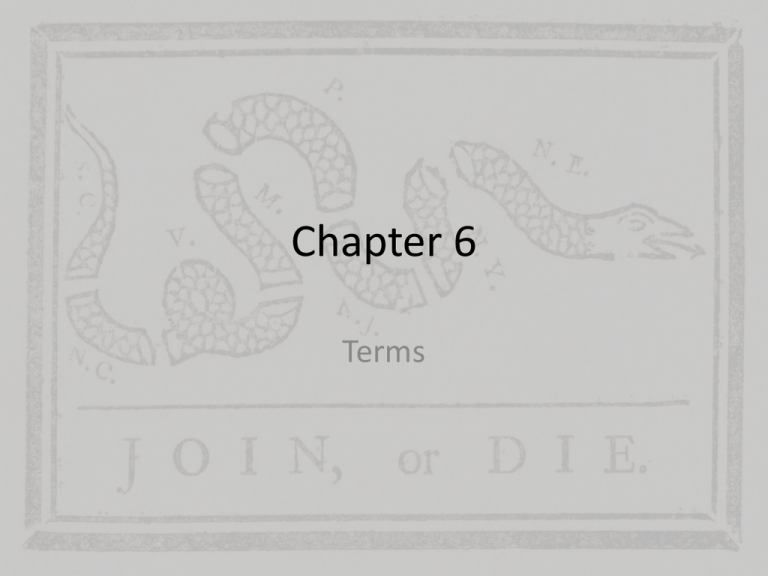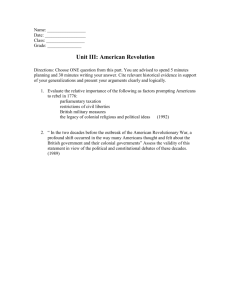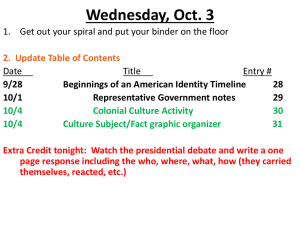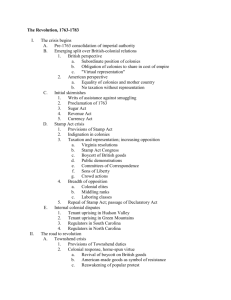Chapter 6 - Cloudfront.net
advertisement

Chapter 6 Terms People • • • • • • John Adams Samuel Adams Arthur Lee Abigail Adams Patrick Henry Colonel George Washington • General Edward Braddock • William Pitt • Neolin – The Delaware Prophet • • • • Pontiac General Amherst Paxton Boys John Murray, Earl of Dunmore • John Peter Zenger People • • • • • • • • John Locke Thomas Jefferson George Grenville James Otis Jr. Daniel Dulany Loyall Nine Andrew Oliver Thomas Hutchinson • • • • • • • • Sons of Liberty King George III Charles Townshend John Dickinson Daughters of Liberty Francis Bernard John Hancock Crispus Attucks People • • • • • • • • Fredrick Lord North Richard Henry Lee General Thomas Gage George Washington Christopher Gadsden Joseph Galloway John Jay James Duane • • • • Paul Revere William Dawes Ethan Allen General Richard Montgomery • Benedict Arnold • General William Howe • Virginia Governor Dunmore People • Thomas Paine Events • First Continental Congress • Seven Years’ War / French and Indian War • Albany Conference of 1754 • Braddock’s Defeat • Treaty of Paris 1763 • Pontiac’s Rebellion • Germ Warfare • Royal Proclamation of 1763 • Conestoga massacre • Treaty of Hard Labor • Treaty of Fort Stanwix • Dunmore’s War • Sugar Act Events • Stamp Act • Virginia Stamp Act Resolutions • Stamp Act Congress • Declaratory Act • “save your money and save your country” • Revenue Acts • Massachusetts Circular Letter • Boston Massacre • Repeal of Townshend Acts • Tea Act • Hutchinson Letter Affair • Boston Tea Party Events • Intolerable Acts – Boston Port Bill – Massachusetts Government Act – Administration of Justice Act – Quartering Act – Quebec Act • First Continental Congress – Declaration and Resolves • The Siege of Boston • Second Continental Congress – – – – Continental Army General Washington Olive Branch Petition Declaration of the Causes and Necessities for taking up arms • Battle of Bunker Hill Events • Declaration of Independence Places • Nova Scotia • Louisburgh • New York/Canadian border region • Ohio country • Forks of the Ohio River • Halifax • Fort Duquesne • vice-admiralty court Halifax • Lexington and Concord • Havana • New Orleans • Fort Ticonderoga • Breed’s Hill Terms • Benjamin Franklin’s Plan of Union • Cajuns • “Indian Country” • Yankees • Lobster • Whigs • republicanism • • • • boycott nonimportation inalienable rights “no taxation without representation” • “virtual representation” • Considerations on the Propriety of Imposing Taxes Terms • • • • “actual representation” “Liberty tree” effigy Letters from a Farmer in Pennsylvania • Board of Commissioners of the Customs • non-consumption • “liberty pole” • Committee of Correspondence • Boston Pamphlet • Committees of Observation and Safety • Loyalist • militia Terms • minutemen • Common Sense Concepts • The cultural make-up of the first Continental Congress • Importance of F&E War on British – colonial relations • Colonial assembly rejection of Albany Plan of Union • Native American attempts at prolonging colonial rivalries • Pitt’s promises – Crown pays for war (get colonial help) – Clear boundaries between Native Americans/Colonists (get Native American help) – Win the war in North America • Native American view towards British • British attitudes toward Native Americans Concepts • Colonial attitudes toward Proclamation Line • Britain’s attempt to reign in colonies • Birth of American Nationalism • British treatment of soldiers reflects on potential treatment of colonists • Antagonism between British regular army and colonial militia • The Seven Years’ War and the growth of an American identity • The role of newspapers and the dissemination of information Concepts • The press becomes “continental” • The use of “American” • The British need to pay for troops in the colonies and colonial reactions • The end of salutary neglect • The supression of the rights of Englishmen • The crackdown on smuggling • The effect of high taxes on colonial attitudes • British ideas of representation vs colonial ideas of representation Concepts • Colonial attacks on British officials – rejection of authority • The resistance spreads form urban to rural areas • British issues at home force the government’s hand with little thought of the colonies • Colonial fears of British attempts to subvert their liberty and proof – suspension of New York assembly due to colony’s refusal to pay for quartering of troops • The creation of viceadmiralty courts in major colonial cities Concepts • The power of nonimportation and its use by colonial assemblies to project their authority • Riots in major cities e.g. NYC, Boston due to British and Colonial conflicts • British attempts to subvert colonial autonomy and authority • The evolution from colony to state • The King’s desire to suppress rebellion Concepts • Britain's belief that they were fighting a minority of individuals instead of freeholders who believed they were defending their homes and their liberties • Colonial and Canadian divergence • Other European nations’ attitudes towards the colonies – Spain sells weapons – Caribbean wants to but can’t help – France will send supplies • The Continental Congress takes actions towards independence






